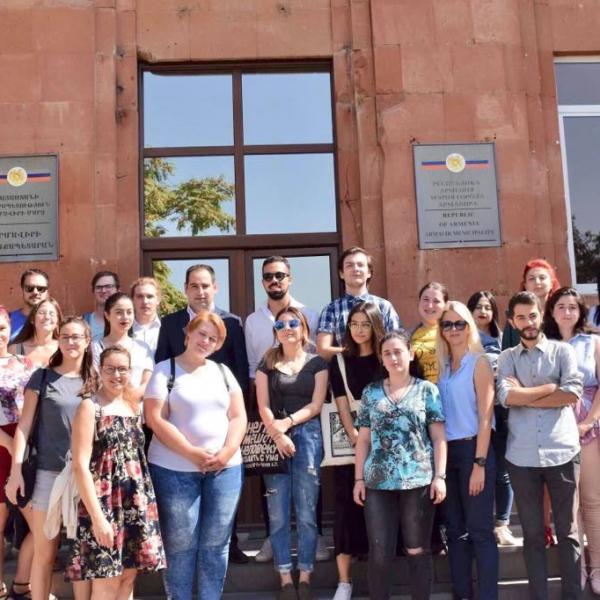+(374) 237 23034 | [email protected]
On 22-30 September 20 youth workers from 4 organizations of Armenia, Estonia, Georgia and Italy gathered in Armavir town, Armenia for the training course “Partnership for Innovative Entrepreneurial Education” in frames of the Erasmus+ KA2 project. The aim of the training course was to deepen youth workers’ understanding of mentoring and entrepreneurship, and how these two fields can be synchronized for mutual benefit, and this is exactly what they did during the 7 working days of the project.
First of all participants went deeper into the image of a youth worker, and when they did so, they got acquainted with the characteristics of a mentor and drew parallels between these two, as they were supposed to use their skills as youth workers to become mentors for young people in the field of entrepreneurship. This means, that the next two important components to discuss should have been entrepreneurship, and the needs that young people might have in the field. To understand what is entrepreneurship and how to become a good entrepreneur, participants not only had an informative and interactive session on it, but also tried to create their own start-up and business ideas. They also had the opportunity to visit “Hero House” foundation, which spreads the Startup Hero culture in Armenia, and to a local children support center as an example of successful social entrepreneurship. On another day participants also had a guest speaker – Artavazd Minasyan, who is the co-founder of one of the best start-ups in Armenia. They listened to his experience, asked questions and advice, and had a lively discussion.
Youth workers not only got tools of understanding the needs, interests and expectations of the mentees, but also a tool of self-evaluation for their own skills and attributes. Through this forms, each of them understood what skill they lack as a mentor, and came up with ways of improving it.
As for understanding the needs of young people better, and finding the ways to satisfy these needs, participants worked in groups and created projects according to the Erasmus+ criteria on specific needs and problems they identifies in the target groups they are working with. They also did research in national teams to find out what recourses their countries have, that might be helpful to their mentees.
Youth workers also had a Skype session with the expert of the project who has created the Innovative Manual that will be used during the mentoring process. They not only learnt about its essence but also went deeper into the psychological side of mentorship. Afterwards they got acquainted with the mentoring agreement, the responsibilities and rights of each side – mentor and mentee.
As a summary for the training participants learnt how to pitch their ideas, work hard on them, practiced them and made the pitches in front of a jury. Thus they not only learnt how to come up with ways for meeting young people’s needs, but also acquired techniques for pitching, and may help their mentees to prepare pitches if needed.
After the evaluation on the last day it was clear that youth workers were ready to go back and start their mentoring process with 2 youngsters each, with great enthusiasm and armed with necessary knowledge and skills. In 6 months they will meet again to already discuss the results of the mentoring, what worked and what didn’t, what should be changed in this process and in the manual, and what should be improved for going on with the mentoring process for another few months.
